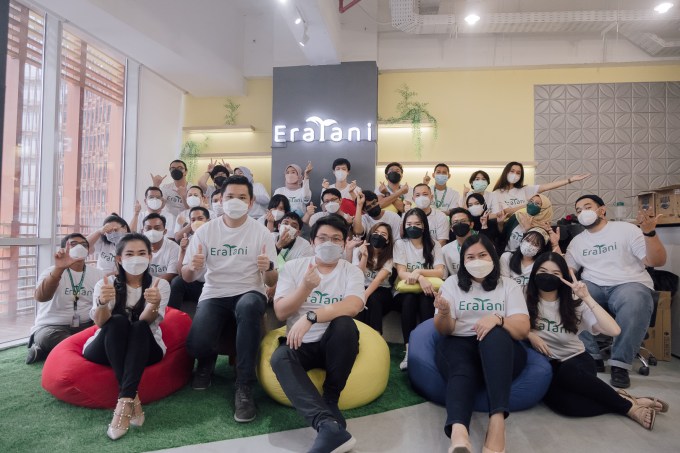About 29% of Indonesia’s workforce is in the agriculture sector, but many small farmers face challenges like low access to working capital. Eratani is an end-to-end management system that helps them get financing and supplies, and then helps them sell crops once they are ready. The startup announced today it has raised an oversubscribed $3.8 million seed round led by Singaporean VC firm TNB Aura, with participation from AgFunder, Trihill Capital and B.I.G. Ventures.
Founded in 2021 by Andrew Soeherman, Kevin Laksono and Angles Gani, Eratani is now used by more than 10,000 farmers in Java to manage a total of 8,000 hectares producing 52,000 tons of rice. Its target is to work with more than 50,000 farmers by the end of 2024.
Soeherman’s uncle ran an agricultural supplies business, which gave him a look into the difficulties faced by farmers while he was growing up. He told TechCrunch that most agritech players address farmers’ downstream needs, so Eratani was originally developed to deal with upstream issues, before turning into an end-to-end management platform for farms and goods through the entire production cycle.
Some of the challenges Indonesian farmers face include needing to borrow money in order to purchase agri-input supplies from stores. They pay off those loans after they sell their crops, but interest is about 20% a month, said Soeherman, which means they are caught in a cycle of debt. “In Indonesia, there are 33 million farmers and the majority are aged over 45 years. If nothing changes, within 10 years Indonesia will experience a farmer regeneration crisis.”

Eratani’s team. Image Credits: Eratani
Eratani’s management platform is divided into three parts. The first, Agri Financing, gives farmers access to working capital they need for the planting process. Agri Inputs provides agricultural supplies with usage recommendations from its agronomist teams. Finally, Agri Output is a market price system for use during the crop distribution process.
Eratani also collects field data statistics to increase farmers’ productivity. Through the platform, farmers have access to Eratani’s agronomists who can help them with strategies to increase their crop yield.
The startup currently has several collaborations in place with the Indonesian government. This includes a partnership with the Agricultural Ministry of Indonesia and the Indonesian State Logistics Agency to develop the agricultural ecosystem, with the goal of achieving food independence in Indonesia, and another one with the Agricultural Ministry of Indonesia to increase crop yields and farmer income. It is also part of the Ministry of Communications and Informatics’ Startup Studio Indonesia.
Agritech startups are proliferating in Indonesia and some that have been covered by TechCrunch include B2B marketplace AgriAku, agritech platform TaniHub and “sea-to-table” startup Aruna.
Soeherman said Eratani differentiates by creating an ecosystem for the entire agricultural process, but he doesn’t see other players as competition. “In the agritech industry, we believe that the entire community should come together to support and encourage the Indonesian agricultural industry. Despite having over 70+ agritech companies operating within the space, there is still a long way to go as it is estimated only 3% of Indonesia’s farmers have benefitted from these technologies overall.”
In a statement, TNB founding partner Vicknesh R. Pillay said, “The agritech space in Indonesia has reached an inflection point due to its presently fragmented nature. Eratani has brought to the table a farmer-centric approach along with a strong team and existing partnerships in the space, and we are excited to begin this journey with Eratani.”
Eratani supports Indonesia’s farmers through the entire growing process by Catherine Shu originally published on TechCrunch
from TechCrunch https://ift.tt/9lFJehX
via IFTTT
Comments
Post a Comment